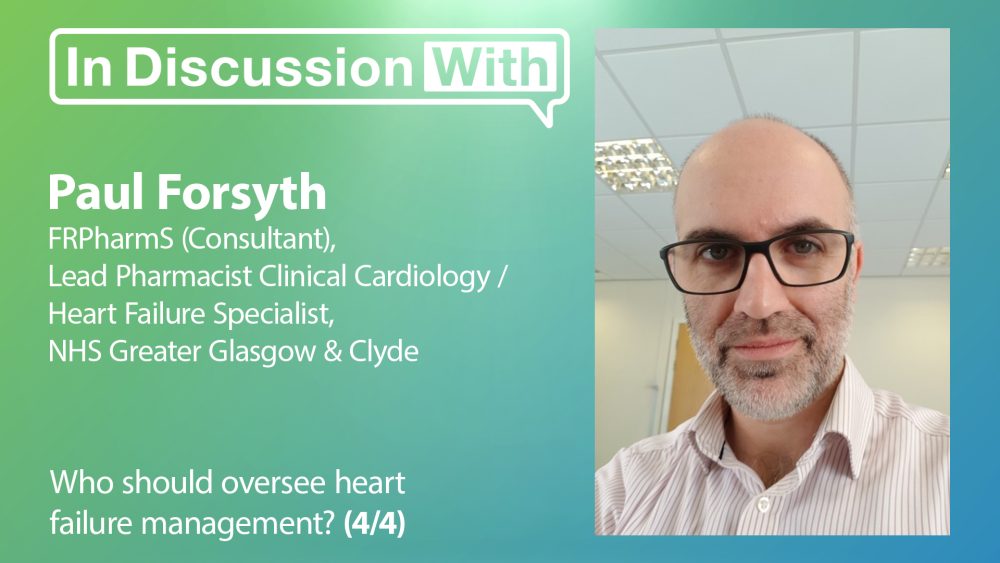Advertisment
Who should oversee heart failure management?

The management of heart failure treatment is probably best done by a primary care team and pharmacists can play a major role in prescribing, says Paul Forsyth, Lead Pharmacist, Clinical Cardiology at NHS Greater Glasgow and Clyde.
Polypharmacy can be a problem for patients with heart failure who may also be taking medicines for other conditions. A systematic review on polypharmacy in heart failure by Dr Janine Beezer and colleagues has explored this topic in detail, says Mr Forsyth. In many cases patients have other conditions – for which they receive drug treatment – long before they develop heart failure. In some cases, other medicines may have contributed to the development of heart failure. “We know that certain medicines can be implicated in causing heart failure in the first place – things like certain diabetic medicines or certain painkillers and so we must stop medicines because they’re actually worsening the scenario”, he says. “We shouldn’t just be looking at our drugs, we should be looking at all the other drugs that you’re [taking] and think about whether we can rationalize them a little bit, as well”, he adds.
Overseeing heart failure treatment
Management of heart failure patients is best undertaken by a team in primary care because “patients typically want to be treated as close to home as possible by the person that they have most relationship with and has the skills and the knowledge to treat them appropriately”, says Mr Forsyth. For much of the time prescribing and management decisions can sit in primary care, with occasional input from specialists, for example, when newly-diagnosed or when there is worsening of the condition. Once the specialist team has determined the causes of heart failure and designed a treatment plan, this can be delivered in primary care, although some improvements could be needed, he concedes. When heart failure first develops patients almost always consult a generalist first – “a general clinician, a general practitioner, a general nurse, a general pharmacist or an acute general physician in the front of Accident and Emergency. So, we cannot beat heart failure through specialists alone – we need our generalist colleagues, we need really upskilled generalist colleagues that know what heart failure is, the basics of how to diagnose it and really can [take] forward and follow treatment plans”, he says.
Cardiology pharmacy
Mr Forsyth’s advice to young pharmacists who might be thinking about specialising in cardiology is unequivocal: “There’s no better place to work as a pharmacist than in cardiology and heart failure”.
Working in a cardiology team satisfies the desire to help and care for people and to offer something meaningful to patients. “I would suggest to you that cardiology is one of the prime examples where a pharmacist can do those things. So, it’s very clear what we’re trying to do …… to prevent heart disease from re-occurring in the future. …… You get the ability to use your skill set as a pharmacist with these complicated factors – to look at the patient in front of you to try and get them on to the most appropriate and the best treatment. I believe that you can meet all of these conditions working in heart failure or cardiology as a pharmacist…….. You’ll go home thinking that you helped people and that’s probably what drew most people to pharmacy in the first place”, he explains.
Pharmacist prescribing
Specialisation in cardiology also offers pharmacists scope for prescribing. “From 2026 onwards all pharmacists that are leaving university will be independent prescribers from the first day that they register”, says Mr Forsyth. With appropriate governance and support, prescribing pharmacists can flourish in the cardiology team, he suggests. “I’ve got patients you can help; if you want to prescribe, come and work with me because I’ve got patients that [could] benefit from these four drugs that we want to give them and we can’t get them on to them quick enough”, he says. “If you want to prescribe, we will help you and you help us and we all help the patient – and there’s very few places that are like that, so it’s a place that you can really find a home”, he concludes.
Read and watch the full series on our website or on YouTube.





